On The Record with FINA’s Andrey Kryukov; Water Polo’s Future Rests on Him
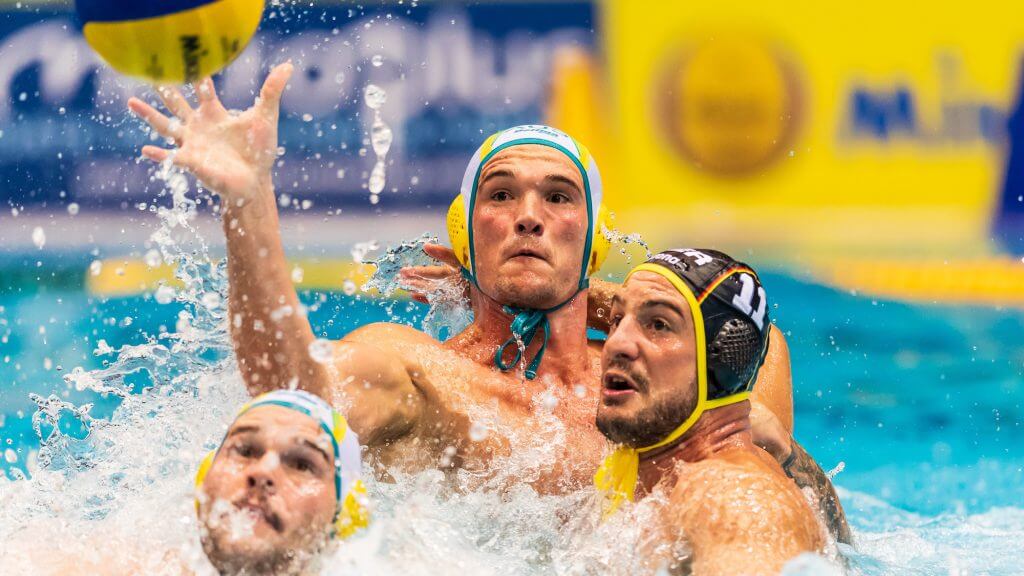
By Michael Randazzo, Swimming World Contributor
Andrey Kryukov, Bureau Liaison for FINA’s Technical Water Polo Committee, may be the world’s most important decision-maker regarding water polo’s future. The Kazakhstan native is spearheading FINA’s ambitious effort to reform polo, which includes overhauling rules in a sport which for decades has stubbornly resisted change.

He and his FINA colleagues are under the gun—the 2020 Tokyo Games are less than two years away—to restructure play, or the Olympics’ first-ever team sport risks be dropped from competition despite more than a century of participation.
A former polo player for the Soviet Union, Kryukov is Secretary General of the Kazakhstan National Sports Federation and also Vice-President of the Asia Swimming Federation (AASF). In August 2017 he was tapped by FINA, which regulates all aquatic sports, to be its chief decision-maker for international water polo. In this capacity he is overseeing sweeping reforms, including reduced rosters for the upcoming Olympics and a bevy of rule changes that will greatly impact the way the sport is played.
The first step in pulling polo into a new century was a three-day conference held last May in Budapest where 200+ coaches, players, referees and FINA delegates gathered to assess the sport’s health. Next, there has been gradual implementation of changes that came out of the conference, with the recent FINA Men’s Water Polo World Cup 2018 tournament in Berlin representing a prime opportunity to test out amended rules.
Last week Kryukov and FINA Bureau members Erik Van Heijningen spoke with Swimming World prior to the World Cup final between Australia and Hungary about polo’s underlying challenges and the race against time and tradition to change the sport.
– There are some who believe that water polo’s very existence as an Olympic sport is threatened. Do you agree that this level of concern is warranted?
First of all, we understood that all sports in the 21st century must develop, redevelop and upgrade. The IOC [International Olympic Committee] is always looking for new [sports] because this is the market; lots of new opportunities to be part of the Olympic program because this is a guarantee of government support.
If you are not compliant with 21st century requirements your sport will lose attractiveness.
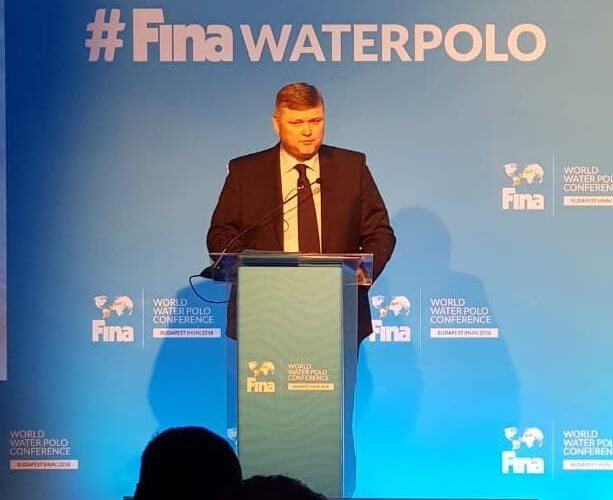
Andrey Kryukov. Photo Courtesy: FINA
The second circumstance to take into account is [water polo] is the first team sport in the Olympic program. We’re unique; we’re in the water. Our sport is three dimensional. Usually in any game, players fight with their opponents only. In our sport, you fight with the environment.
But, we have to understand. The sport was created and the rules were written 127 years ago for great big boys who like to play rugby in the water. Now the sport is played on TV, and girls 15 years old play [it]. That means the rules have to be adjusted.
In [its history the] sport has developed according to the times. But the rules have become a collection of different [interpretations]. Some Canadian, some British, some Italian, some American. They’ve become too big and too heavy. For example, exclusion. We have six articles to regulate exclusions.
It’s wrong. We need to adapt rules to modern language; we need to adapt to the times we’re playing in.
– What can the sport specifically do to allay these concerns—in addition to the proposed changes that are now being tested?
This is very important, an essential thing for water polo. The process is already underway, an initiative of FINA President [Julio] Maglione because everyone understood this was a big threat—now we receive limitation for 11 players for Olympic games. It shows we need to look precisely at our game.
Immediately we began working [to gather] many opinions—which we have to collect from outside; we as professionals look at the sport from inside. For coaches it’s very sophisticated. But, to look from the stands or from TV you have to look at the game through those eyes, not from what is sophisticated for someone else.
At the conference we invited specialists—widespread from all water polo society: referees, spectators, coaches, athletes. We put all at one table and asked the question: what do we have to do to make our sport better, to make it more attractive?
The result of this is what you see today. Those 18 [rule] amendments are not hidden—no! It was clearly proposed from the conference by all referees, all coaches, all professionals who approved this first package of amendments to make our sport more attractive, to make it cleaner, to protect movement in the sport.
What the problem is [polo] has become a sport of giants. Three top teams always two-meter tall players, very strong. The “sweet spot” of athletes becomes very narrow. If you are not two meter or 1M-90 you don’t have a serious future in water polo.
Our sport demands very high performance the entire game. For example, in other sports you play five, ten minutes you’re finished. This sport you play one hour at a very high-level performance in the water with an equally strong opponent under difficult conditions.
Players must be strong but not only; they must be clever, as in any other team sport.
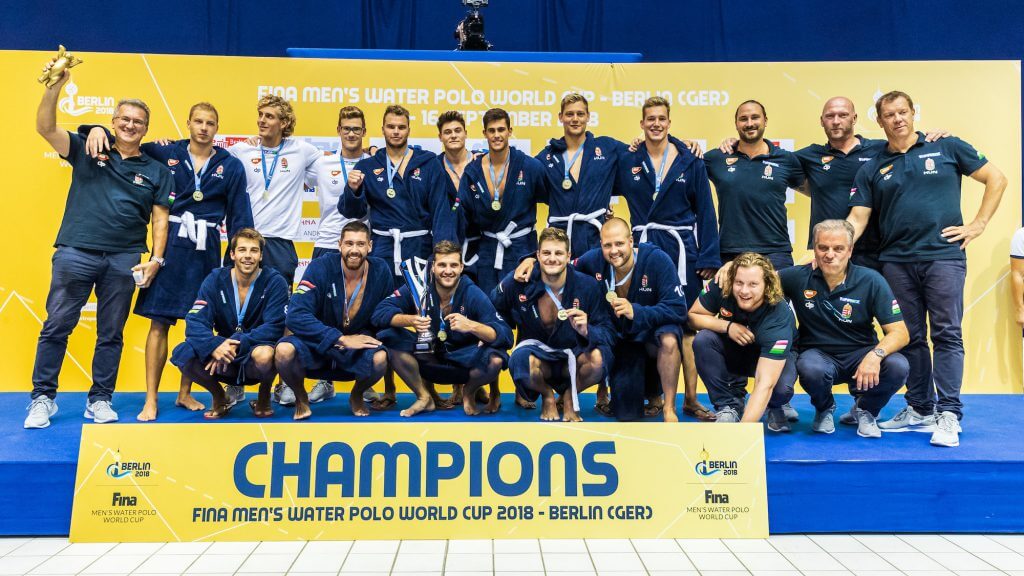
Hungary is happy with the new rules—they won!. Photo Courtesy: Sportphoto.shop
As you will see in medal standing today, these rules provide there are two teams that have never been in top four in the world. Like Australia, like Germany; see how well Team USA play. See how the team of Japan plays well. They’re not big but it’s very important to amend the rules to be applied as they are written. Not as they’re interpreted by the officials.
– So a key concern is to allow smaller players to move freely among the giants?
In the rules as written, any movement that is impeded must be protected, it’s an exclusion. It must be punished. That’s it. Any other interpretation is breaking the rule; the interpretation cannot break the rule. The interpretation can adjust the rule or even explain how it must be applied. But not change the rule.
That’s another way that we’re trying to adjust. You see that big teams like Serbia, Croatia… Hungary less. Hungary adapted very well. You see in the first game they play old game [but] they understood: under such rules old game will not provide any advantage. Only they have to use the new rules which they quickly adopted and now they’re in the final.
Maybe they’re not the best team the past few years but they’re in the final here because they quickly recognized how to use these rules. You see live substitution and how it’s properly used. The teams that used [this rule] they keep same level of performance all four periods. They put two, three players on the side and change quickly. Performance stays at a high level.
– So offense is what makes the game more attractive…
One of the very good effects of the new amended [rules] is: after every stop in the game, it became a danger moment because the player can shoot. His defender has to [pay attention] to him. This provides more variety of goal scoring.
This is another effect because before we had five to eight usual goal scoring types, like exclusion, like the penalty. Now it’s something like 10 – 12 [possibilities]. You see how many goals scored from different positions.
It was very interesting how players quickly adapted to these rules. The second challenge is the referees because they are the tool that most affects the game. Our philosophy is to reduce their ability to affect the game—to minimize as much as we can.
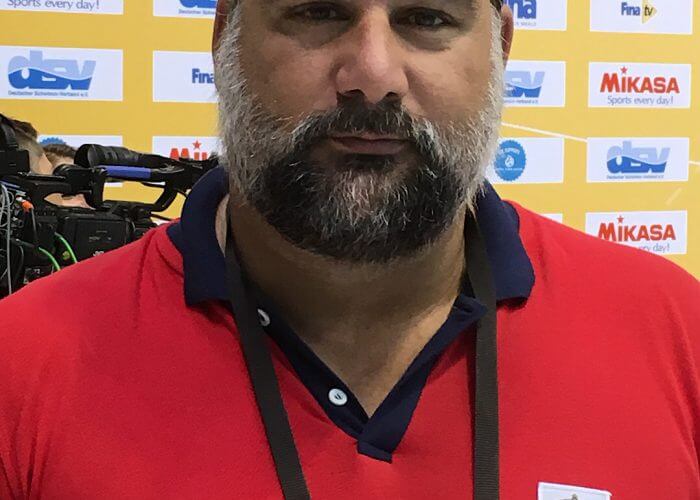
Serbia’s Dejan Savic. Photo Courtesy: Matthias Beckonert / www.wasserballecke.de
At the beginning of the tournament it was very hard for referees because one week ago they were working under old rules and now they have to work by the new rules. That’s difficult for them but by the end of the tournament we arrived at a very good level of officiating and whenever small parts of this game become more or less relative to each other, it worked very well.
You see very clean games like yesterday, Australia vs. Germany. They swim from up to last second. The exclusions were nine to six—a very small number. It’s nothing. And they scored more than 20 goals. This is a big effect. Before we averaged almost 17 goals per game; now we have more than 20. Goals are why we watch the game.
It’s 25% more goals scored per game. 25% more action time because we cut boring time by this 20 second rule. The philosophy is this: to keep danger moments even when the game is stopped because this provides advantage to attackers. If you have ball possession, more danger position must be provided to you.
– … and more credible.
The third point is credibility. Discussion around water polo many years ago and even last year because of subjective refereeing and decision-making. That really affects credibility because when people see something on a screen like one player punching another one. This was the case in a competition a few months ago; it was everywhere on the Internet that the referees did not take any action.
In this case we implement technology that will help referees to take a decision—not to make a decision. We call it post-game brutality review. [Action] can be reviewed after the game by request of the coach or at the request of the delegate. If they found clear brutality case, [a player] will be punished more than they would be punished during the game. If referee miss it [because of game action] it’s okay. But, if he looks at this and he doesn’t take action, he will be punished also. This is very serious; we did already one case in Junior World Championships because one team protested.
And you see here, no brutality at all. Players know the price is very high.
– What is the new penalty for brutality?
It depends on the level [of brutality] but it could be three games. This is an important tool to reduce incidents [of violence] which will change our image. Players will know what happens and they will apply this 100%.
Another technology is the goal definition system. This is four cameras installed on the goal line. It’s only four months since the conference and it’s already here.
– When would you start implementing this system?
Post-game brutality is already [in place]. The Water Polo Match Monitoring System can be used for referee education. For example, delegates, when they sit on the match, they watch and see how referees [are] working. There are two things [they’re looking for]. One, he’s evaluating the referee. When he sees a mistake he tags a button; after the game he receives a full set of clips with the referee’s mistakes. This is part of the evaluation and education of referee because they go immediately after the game and discuss what they did wrong and explain why.
These affect [referee credentials]—the number of points that they receive and affect his career in the future. Referees becomes more responsible for this now. This is a record that is stored; any moment we can pull it up and immediately review it.
Another system [is to] review the goal / no goal, this is just now in test mode but the first time we will use it is in the third round of World League next year in March.
– There’s now a lull in this evaluation process, right?
This competition now finishes the series of testing events for the [new] rules and the next step will be the Technical Congress to approve the rules in December. In that time, all federations have to comply and will play by these rules. We need to develop a protocol of how the system is used, the regulations, etc. This is under development because we need to understand how to [implement].
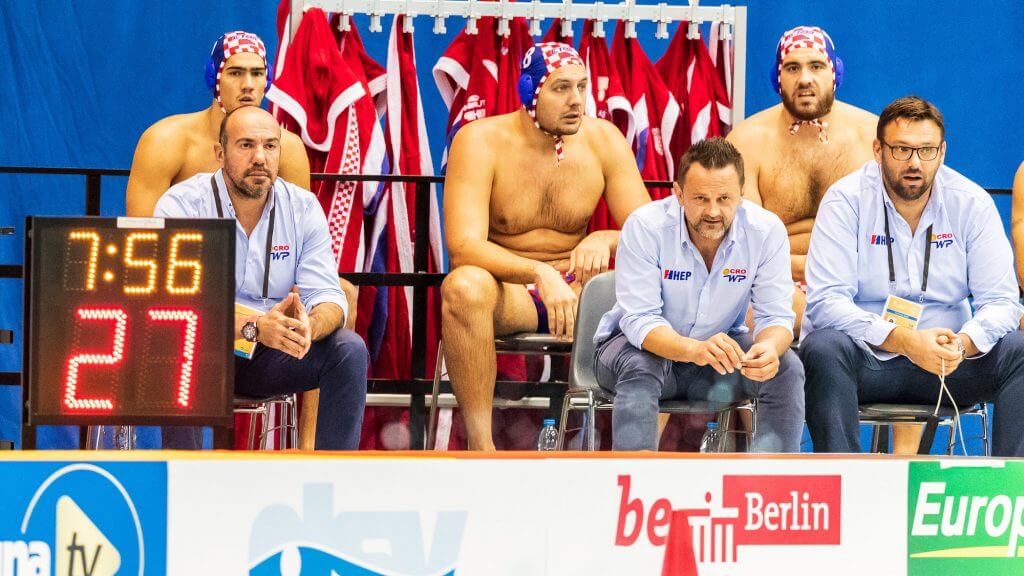
Where do Croatia and Serbia fit in the new polo? Photo Courtesy: Sportphoto.shop
Our opinion is clear; if there is any tool that can help referee to take a proper decision—for example, the [2012] Olympic Games in London when a goal was scored, and all the world saw it, except referees. They made the wrong decision and it was a big fight afterwards. This is also part of credibility. It’s also part of spectators’ experience—there’s a review on the screen which shows the [incident] again and again in slo-mo.
The technology provides us a lot of possibilities to review subjective decisions of referees. We will develop and implement fully on the world championships in Korea next year. Now it’s only in test mode. We have tons of statistics and information that will help us to work [out guidelines].
The most important thing are the teams and the players. They will adapt—not so fast as we want—but you see here the difference. Again, we come back to the medal standings. Teams that played old rules in the European Championship unfortunately they don’t have time to learn these new rules, but they’re trying here as you see—the Serbians they pulled the goal-keeper [as an extra attacker].
A team that is more adapted, like Australia, Like Germany, like Japan, they use all advantage of the new rules. We have a lot of feedback from a part of our society—coaches, spectators, professionals—all of them positive about this [change]. For many years it looks like water polo did not implement big changes. They looked to the ball [size] or the goals—to hardware.
Our program is different. First, credibility. We have to regain trust in what our referees do and to trust fair play. Second, game cannot be boring. On the market there are lots of games that want to challenge—you see this rule 20-20-20? it clean out game completely from boring moments. There’s no time now for spectators to keep eyes for 10 – 20 seconds on the same [area]; it’s always moving.
The biggest effect of this, nobody expected in the beginning when we applied; we predict there will be some effects that we didn’t know [of], but it’s very good that players on attack take the decision to shoot five, six seconds earlier because there’s no time. This means that every 15 – 20 seconds [there’s] a shot. Now we have 60 – 70 shots per game. In 20 second, you divide, every minute there’s two – three shots.
Shot is the result of an attack and this is what people are looking for.
– I go back to the shortened roster; what competitive sport with exclusions has less players on the bench than in field?
Play without violating the rules, you will not have exclusions. This is the way to play. Look how Hungary played [three] games ago; it was a high number of exclusions. Next day they play completely different game because they understood, if they don’t [change their play] they won’t finish in the final.
This is what we want: less violations.
We have to remember always; whatever you ask the coaches, they will protect their interest. It’s normal, like any part of society. Coaches need more players, they need more possibilities to have exclusions. This is normal. But, we have to look from outside, what people want to watch. Less violations provide faster games.
We protect movement now; we’re trying to break the psychology of players to be more tolerant to attacker, not break him when he’s [driving] to score a goal. If he scores a goal, your team score [in response]. This is the game which will provide these things.
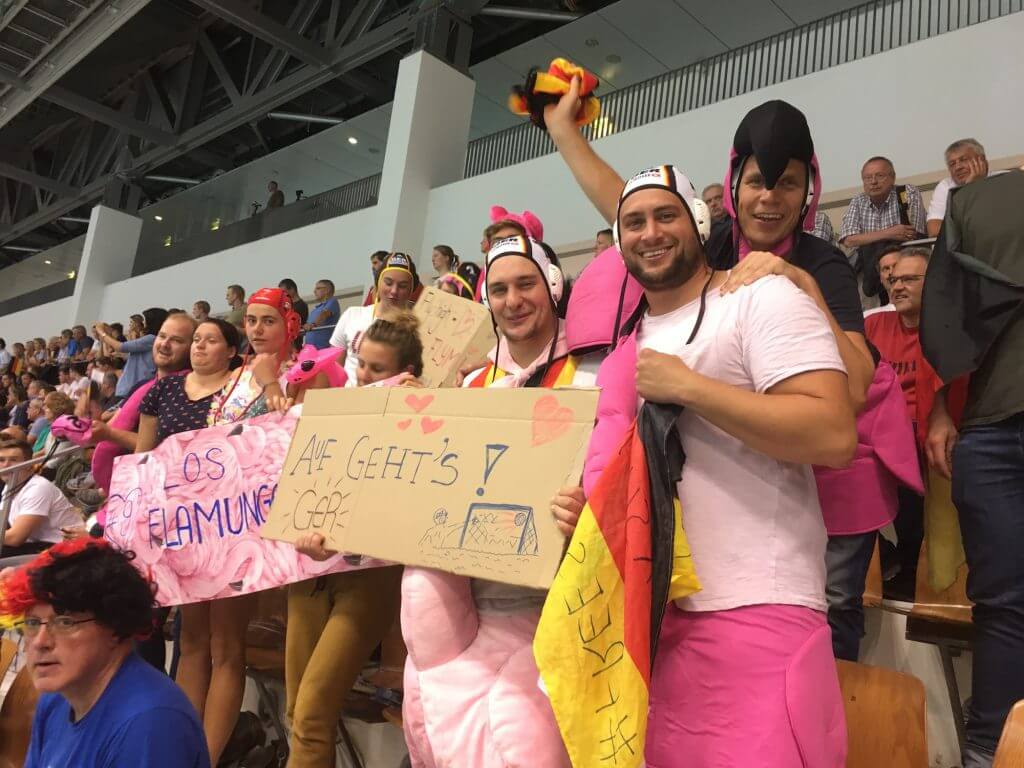
What will keep these folks happy? Photo Courtesy: M. Randazzo
When coaches complain about too many exclusions, we say: These are the conditions where we are now. It will be very wrong if we add possibilities to foul more. It’s against any philosophy of any game.
– So you’re saying that coaches have to change the style of play because there’s a limited arsenal of athletes to compete?
This is the philosophy. Players work well; we do nothing. See this game today. Two equal teams, one play a more physical game like Hungary, one play less physical—more movement game [like Australia] and we will see.
This is key to protect the movement. If we protect violations we will get what we have before. if we protect movement we will be successful.
– In less than two years there will be Olympic competition; FINA is instituting tremendous rule changes. Is this enough time to get it right before the biggest competition in the sport?
These are the conditions where we’re working. Exactly we have [enough] time to finish this. We have a date when we have to go and play in the Olympics with the new rules.
We’ve worked ten months continuously—nonstop, every day—to deliver what we deliver here. For us, it looks successful. Next step? We have many other problems in our sport. Lack of communication. Problems in marketing. It’s a lack of marketing because we don’t have enough sponsors—we have to work on that–we have to work on event organizing because here, this is top-level event. And we have a lot of room to improve.
– As you point out, the instrument of change in your sport are referees. How will you prepare them to best implement the rule changes that you and your team are developing?
This is where we are. We cannot change initial conditions. We see what we can adjust in our daily work. Second, you as a spectator, it’s one of the best effects of this. What do you want to see? You want to see an action game where the referee doesn’t want to interfere.
We have some games [in Berlin] where we only have 29 ordinary fouls. In a normal game, it’s 60! It’s double fouls. We have games usually 100 – 110 whistles. Here we have 60 whistles per game.
What this means, the referee is two time less interfering. The referees will adopt, quickly, but all parts of our society we have to work together to immediately apply to this big job—and education is the big issue.
This is the first tournament. Definitely we have a lot of mistakes. But it’s mainly not mistakes; it’s habits, because the brain is connected to the hands immediately. And players are becoming faster than [the referee] can analyze the action according to the new rules.
This is a problem. But, it will be adjusted, because the referee who are ‘middle level’ are adapting quickly. The best referees they have very clear [reflex actions]. The lower level referee doesn’t have those reflex so they adapt more quickly to the new rules.
Another point are the videos which the delegates prepare will help them to see the moments. Again, they need to work on it.
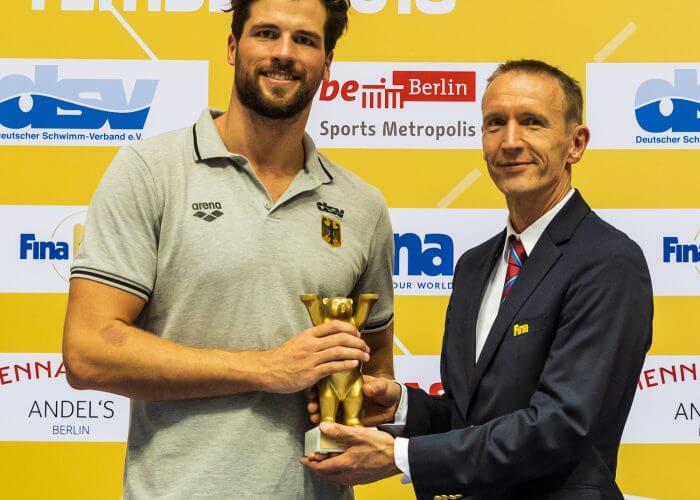
Germany’s Moritz Schenkel awarded best goalie by FINA’s Erik Van Heijningen Photo Courtesy: Sportphoto.shop
– Is there a plan to have more interaction with spectators?
Event organizing is one of the weak points that we have to improve a lot. We start from the rules because we put priority on this because to sell something, you have to have a product you can sell.
If we improve event organizing [first] it will be the wrong sequence. First thing was the rules, and now teams will develop more tactics, next steps are communication, promotion; we need a lot of improvement in these areas.
Erik Van Heijningen:
Six years ago, at the European Championships in the Netherlands, we did it. We hired a presenter; he gave the explanation to the spectators. It not only depends on FINA, it also depends on the thinking of the organizer.
It is to explain and to entertain.
One final remark; Andrey and his staff have been working night and day for 13 months. All that has been reached right now is thanks to the commitment of these people. Amazing!
This is really a major effort, and it’s a personal investment for all these people here.
Sometimes you know you are going to win the game. And this is the moment.
You are witnessing historical moments!
– What happens if this effort fails?
I am 100% sure [it will succeed]. This is essential; when people work in the proper way, then they will succeed.




.png)
Water Polo is not only the first team sport in the Olympic Games, but is is also the only true team sport played in water. Referees play a very important role in making Water Polo more attractive and encourage more young people to take up the sport. As such any moves to improve the standard of refereeing, especially against brutality, and to ensure that referees implement the rules and not interpret the rules are most welcomed.
Dear Secretary General Kok Chi:
Thank you very much for your comments. I agree that the referees are pivotal in any reform of water polo—which is why I was thrilled with the opportunity to speak with Mr. Kryukov. There’s no question this is a pivotal moment for the sport, and engaging in a frank and productive examination of polo’s flaws is essential.
What I’m NOT so certain about is how the coaches get their say in these changes. That’s not to say they aren’t being heard; it’s just that they will be the other agents of change in the pool, and must be empowered to work with referees in critiquing and then implementing new rules.
Given the absolute importance of this issue, I’ll have more on where I think this is going.
Your correspondent
Dear Mr. Michael Randazzo,
Thank you very much for your view on “how the coaches get their say in these changes”. My suggestion is to get them involved in the ‘post-game brutality review’ process and the ‘Water Polo Match Monitoring System’. In fact, the coach of the player charged for brutality should also be hauled up for some form of disciplinary action.
Thank you for this comment – especially b/c it underscores that the video system that Mr. Kryukov described will not only punish the offending player BUT will also examine if / how the referee responded, and if they missed (or ignored) the transgression then that referee will also be docked.
As for the coach, what’s interesting is that on the West Coast (of the US) when a player gets into a fight (in the water) both the player AND the coach may be punished with a red card. Not sure is this is what will happen with the Water Polo Match Monitoring System BUT it’s clearly integral to the rules reform that FINA is implementing.
BUT—as I said in a recently published opinion piece—getting this all to work properly will take time; I’m not convinced that the TWPC has enough of that to perfect the new rules / oversight mechanisms in time for the 2020 Olympics.
Your correspondent
Thank you.
Of course! I’m ALWAYS happy to share my opinion!
there is no hope…unless we change this moronic bias that waterpolo has to change in order to please spectators and tailor to “smaller” teams! wtf is that all about! equals to considering lowering basket height because of usa dominance? what about sports like baseball or cricket? most popular sports that no one outside of their respective geographic/cultural boundaries cares about…fish stinks from the top down. legacy of bad managment and leadership is the reason why. players and coaches are paying the price. won’t gonna work.
Coach:
Thank you for your impassioned defense of the existing order! As it happens, I just saw your Terriers play a terrific match against Harvard that was everything a fan could want from a sporting event (https://wp.me/p56Jja-1oeC). A couple of observations; in the early years of the NBA, the rules were changed b/c George Mikan was so dominant. After 1968—the year of the pitcher in American baseball—the pitching mound was lowered to generate more offense. Sorry – I don’t have a cricket example! My point: change—when necessary—can be VERY good, and the effort in Berlin shows promise at a time polo desperately needs it.
After more than a few decades of dominance by the Yugoslavian and Hungarian schools of polo, maybe now is as good a time as any to institute change. And—I have a feeling you might agree with this—the referees must be in the lead because, outside of teams like the Japanese, there doesn’t seem to be any incentive to change a sport that has been monopolized by Serbia, Croatia and Hungary over the last five Olympics.
As to your points about management / leadership, I don’t have enough information to comment; I will say that the effort put in by Mr. Kryukov and his fellow TWPC members working through issues during the World Cup was striking. Plus, good coaches are ALWAYS adept at dealing with changed conditions; in fact, the best coaches exploit those changes to their team’s benefit.
I remain hopeful that is the case here… until proven otherwise!
Your correspondent
Thank you Michael!
I am happy to hear that about SFC-Harvard match. It just proves my thesis. Sorry if i did not elaborate it properly.
Anyhow, fact is that the game is evolving as we speak. And it is going just fine.
Slow but steady. Just compare current game speed and athleticism of players to past if you want proper analogy. In any sport. Very little did rules changes help. It is a natural change. See, Yugo/Hun dominance is a product of systematic and hard work, of people whom are mostly no longer with us.
Change is welcoming of course, but when it is coming from bottom-up. Do not make the players pick up the tab. It is hard on them as it is. Listen to players and coaches instead of tailoring to the fans.
Bottom line, Water polo is not dying. It is beautiful sport played all over the world. Anyone that does not share that opinion should not be around it. imho
Coach:
Well, you would have enjoyed the Harvard / SFC match (it was broadcast on NEC Front Row, BTW) BUT there was a fight in the third period and Harvard’s star was rolled – and then got a red card when he protested too loudly (he deserved it – he slammed the ball down on the pool deck!). While this is GREAT theater, I’m not sure it’s in the best interest of the sport.
The other issue here is that—like it our not—change is being imposed upon water polo by the IOC. So, it’s a “change or die” moment for the sport, and I commend Mr. Krykov / his TWPC colleagues because (apparently) there’s no other choice.
What’s impressive is that in the space of four months the rule modifications went from proposal to implementation. I still think there’s a long way to go on this—and may not be enough time to get it right—but the sense of urgency, and the response, are reasons for hope.
Finally, I know that the old order has worked well for Croatia, Hungary, Montenegro and Serbia BUT isn’t it a good time for others, including the U.S. Australia and—dare I say it!—Japan to enjoy success? If the same four countries win all the time we’re just creating a log-jam at the top (which is why your Terriers needed to beat USC in 2010!).
Your correspondent